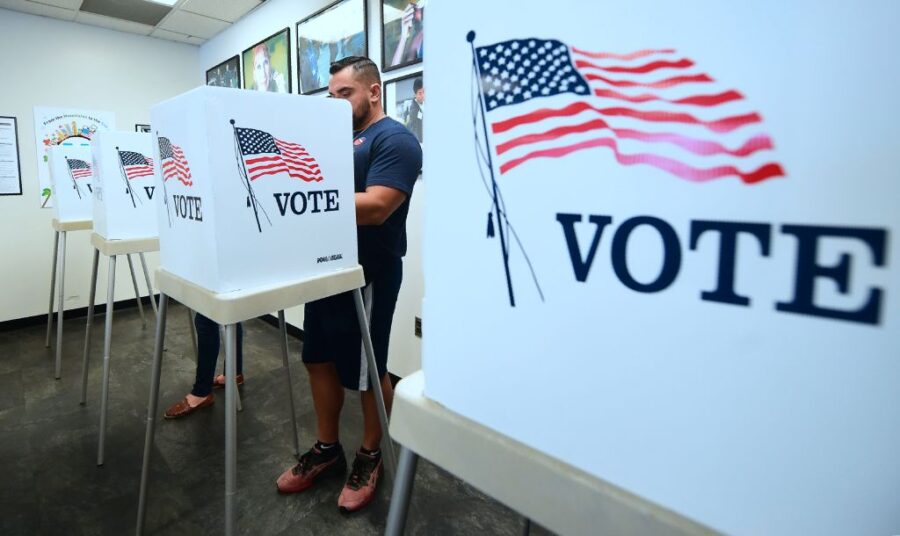The most provocative and vital political statement in the history of the world is, “Jesus is Lord!” Some may say, “Political? That’s not political. That’s spiritual!” But what is politics but the governance of a people? And this statement teaches us how we should put politics in their place on Election Day—and every day.
Mark’s Gospel begins with Jesus declaring, ”The time is fulfilled, and the kingdom of God is at hand; repent and believe in the gospel” (Mark 1:15). Jesus announced a Kingdom of which he is the messianic King. He had come to usher people into the good news of the kingdom of God. A King with a Kingdom ruling a people is political.
We may fail to see the crux of Jesus’ claims, but his day’s religious and political leaders did not. They saw him as a real and political threat. They knew he was not merely making abstract spiritual claims for another place and time. No, they knew what he was saying had everything to do with power and authority in our world.
Mark 11 and 12 depict a series of confrontations between Jesus and religious and political authorities (chief priests, scribes, and elders) during Passion Week. In the first one, they challenge his religious authority (Mark 11:27-12:12). They want to know who gives him the right to say and do what he does. In other words, what were his credentials? Jesus turned the tables on them with his question, leaving them befuddled and slinking off in fear.
Next, the unlikely duo of Pharisees and Herodians conspire to trap Jesus with a hot-button political issue of the day (Mark 12:13-14). Few things could’ve brought the Pharisees and the Herodians together, but the genuine political threat Jesus posed to them did. As early as Mark 3:6, we read: “The Pharisees went out and immediately held counsel with the Herodians against him, how to destroy him.”
The Pharisees were strict religious legalists. They were populists who despised Roman rule and had the favor of the crowds. The Herodians were servants of Herod, the puppet king of Rome. They supported the Roman occupation. The Pharisees viewed them as collaborating liberal compromisers. Today, we might say they were seen as a part of the political swamp.
Jesus’ encounter with them over this political question provides us with a great deal of insight, and we see that he is the Lord of politics then and now.
The problem with our politics
In the Pharisees and Herodians’ encounter with Jesus, they use politics for self-interest in three ways. It does not take much reflection to realize that politics and a fallen world have not changed since Jesus’ time. Their political problems are the same ones that we see today.
- The point is to divide
- The method is hypocrisy
- The goal is power and control
The point of the question is not dialogue, the pursuit of common ground, greater understanding, or any of these things. The reason they approached Jesus with this political hot-button question is to “trap him” (Mark 12:13). They are hunting Jesus because they fear his Kingdom will be a threat to theirs. The whole point in asking the question is that in their mind, either response he provides will trap him, identifying him with one group or the other. The question they bring is intended to bring wrath down on Jesus from one group or the other.
After some flattery (which ironically consisted of factual statements about Jesus, though they did not believe them), they ask, “Is it lawful to pay taxes to Caesar, or not? Should we pay them, or should we not?” (Mark 12:14). A “yes” would identify him with the Herodians and be viewed as a betrayal by expressing loyalty to Roman occupation. The result could be the crowd harming him or killing him. A “no” would identify him with the Pharisees, who despised the tax. Jesus would be marked as an insurrectionist who rejected Roman authority. It could lead to the authorities harming him or killing him. The question was essentially, are you a fraud or an insurrectionist?
Either way, the result will be the division and marginalization of Jesus, which was the whole point. The question related to the poll tax was merely a prop, not a sincere question. Thus, the question was one of hypocrisy, aimed at retaining their power and control, not to help anyone but themselves.
The old saying goes, “The more things change, the more they stay the same.” You could hardly find a more apt description of our modern political predicament than division, hypocrisy, and a self-centered pursuit of power and control. When politics devolve into this grotesque malaise, people often respond with political obsession or apathy. Neither is the proper response for a Christian.
Of course, Jesus is not limited to their horizontal perspective of the world, and not only does he not fall into their trap, but he turns it on them again.
Putting our politics in their place
The text tells us that Jesus, “knowing their hypocrisy,” said, “Why put me to the test? Bring me a denarius and let me look at it” (Mark 12:15). When they do, Jesus begins putting them to the test. He asks, “Whose likeness and inscription is this?” They said, “Caeser’s” (Mark 12:16). Then Jesus confounded them all by asserting, “Render to Caesar the things that are Caesar’s, and to God the things that are God’s.” (Mark 12:17).
The taxes in question were a particular tax called the poll tax, head tax, or census tax. It was paid for the privilege of being Caesar’s subject and had long been a source of division, conflict, and revolt. Jesus’ response teaches us three important truths about our engagement with politics as followers of Christ.
1. Jesus teaches us that our politics matter
The denarius coin used to pay the poll tax was equivalent to a day’s wage. The coin’s front inscription said Tiberius Caesar Augustus, Son of the Divine Augustus, and Pontifex Maximus (Supreme Priest) on the back. It contained the language of emperor worship, which the Roman government thought was necessary for creating stability. Many Jews considered it a mini-idol.
Nevertheless, Jesus said, “Render to Caesar the things that are Caesar’s.” Indeed, the coin was issued by Caesar. As distasteful as living under Roman rule was, there were some benefits (roads, police, military, and so on). Even bad government is better than chaos. Jesus clearly recognizes government as a legitimate institution established by him (Rom 13:1) that all believers should pray for (1 Tim 2:2) and that whenever possible, we should submit ourselves to for the Lord’s sake (1 Pet 2:13-17).
His answer was not that the government is earthly and my kingdom is spiritual, so it doesn’t matter. Nor was his answer that the government is illegitimate and a threat to my kingdom. Jesus teaches that government and politics matter and that his followers should be good citizens. The Scripture teaches the best governments in this fallen world help bring about human flourishing by being an instrument of order, justice, and peace.
2. Jesus teaches us that our politics are not ultimate
When Jesus follows “Render to Caesar the things that are Caesars” with “and to God the things that are Gods,” he immediately subverts the message that the coin claimed. So, when Jesus calls his followers to submit to governing authorities, he also models the limitation on doing so. Politics, while legitimate, possess an authority that is both relative and limited, not ultimate.
Government and politics have an essential place, but not an ultimate one. “Believers have a responsibility to subvert and challenge governmental and political authority, but the dividing line is not our personal preferences but matters of obedience or disobedience to God. Acts 5:29 reminds us that when it comes down to it, “We must obey God rather than men.” No Caesar is the Lord. Jesus alone is Lord!
3. Jesus would not be politically co-opted
Jesus’ politics always transcend temporal political systems and parties. He is the Lord of politics. His Kingdom was one of eternal good news. After Jesus responded, the Pharisees could not say he was against us or for us, nor could the Herodians say he was against or for us. The Scripture tells us they were caught in their own trap and that “they marveled at him” (Mark 12:17). What was clear was that he was above them. Jesus was not politically co-opted, and neither should his followers be.
Application for our politics on election day
With Election Day almost upon us, I want to encourage you in three ways.
- I encourage you to wake up the morning of election day and say, “Jesus is Lord!” I pray that doing so will remind you that government matters, was ordained by God, and your vote matters. Be active, pray, and vote.
- I also encourage you to say that before you fill out your ballot, “Jesus is Lord!” Remind yourself that you are responsible for Christ’s Lordship being reflected in how you vote.
- Finally, I encourage you to submit your ballot and say, “Jesus is Lord” (out loud, as others will need the reminder, too). Knowing that because Jesus is Lord, the following day you can wake up with a smile on your face and a bounce in your step no matter who is elected—because Jesus is the true King, he is on his throne, and his Kingdom is good news, now and forever.










